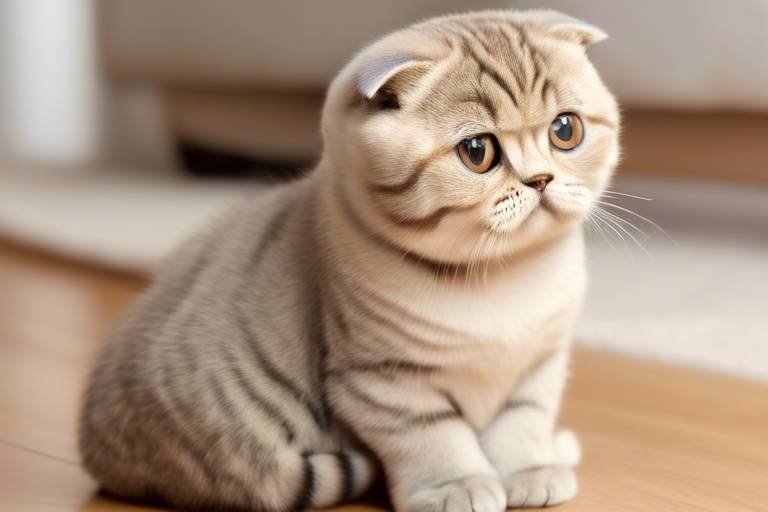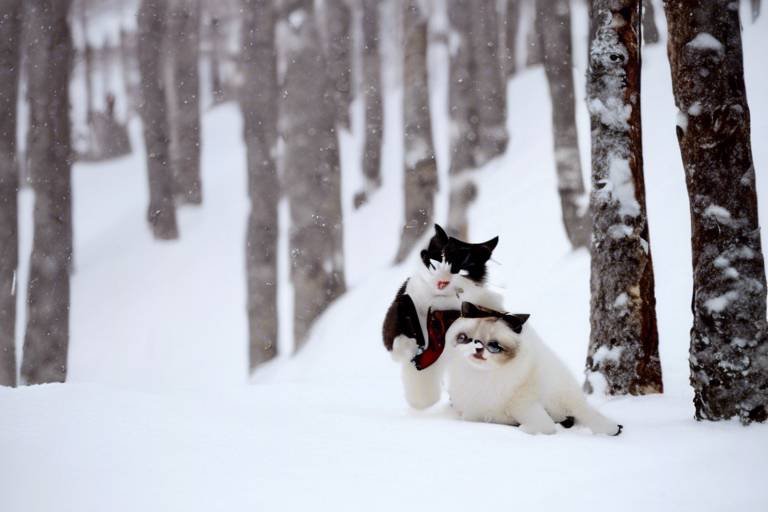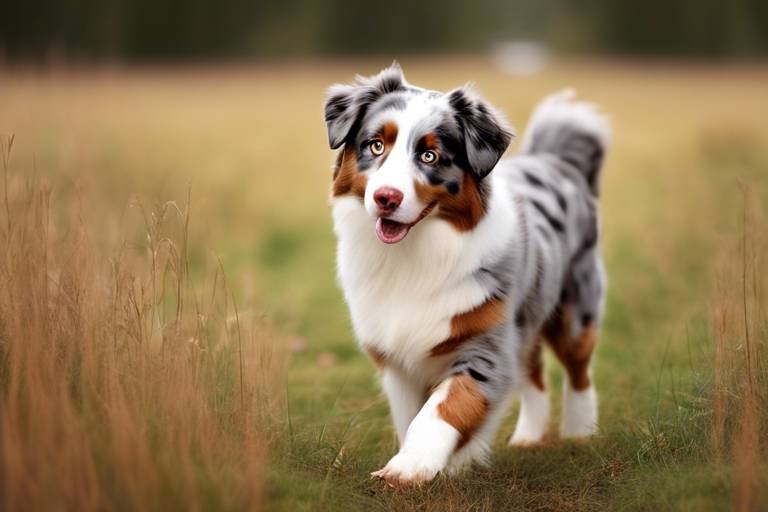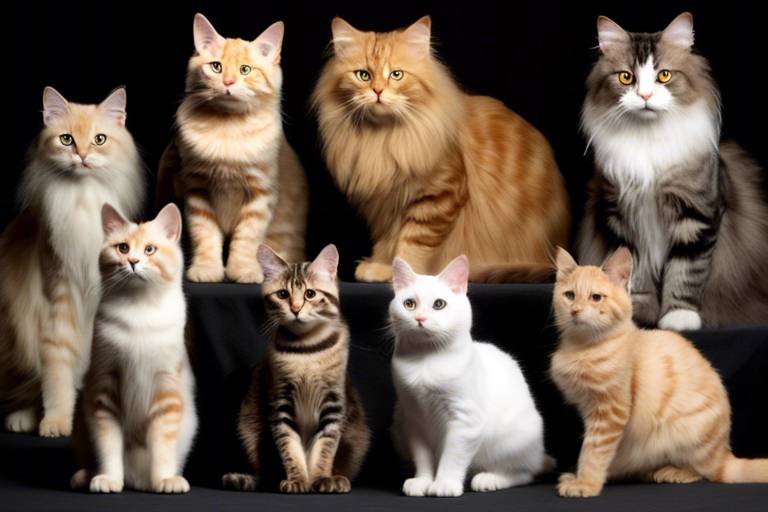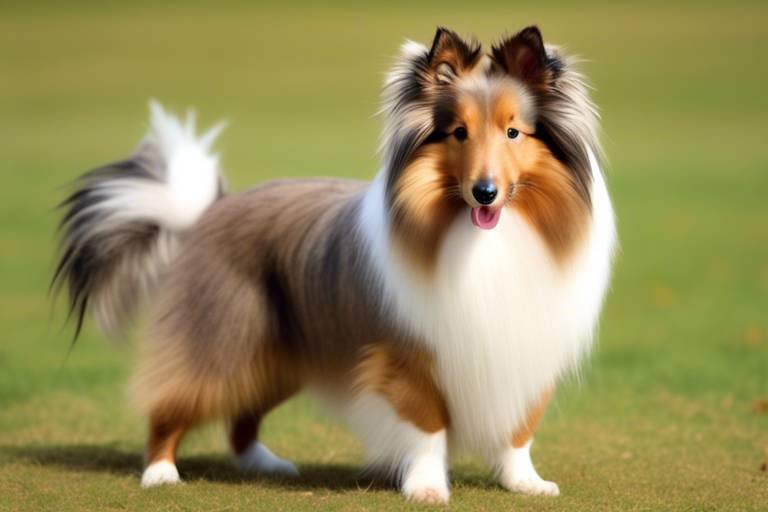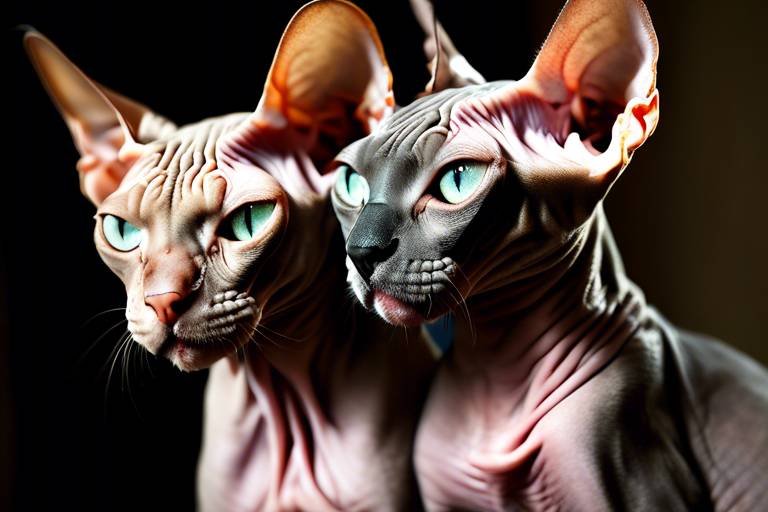Understanding the Gentle Nature of the Scottish Fold
The Scottish Fold is not just a breed of cat; it's a delightful companion that brings warmth and joy into the lives of those lucky enough to share their home with one. Known for their unique folded ears and round faces, these cats are more than just a pretty face. They embody a gentle spirit that makes them incredibly appealing to cat lovers around the world. But what exactly makes the Scottish Fold so special? In this article, we will delve into the unique characteristics, temperament, and care requirements of these charming felines, exploring why they are cherished by many and how to nurture their gentle nature.
First and foremost, let's talk about their temperament. Scottish Folds are renowned for their calm and friendly demeanor. Unlike some breeds that may be more aloof or independent, these cats thrive on human interaction. They are affectionate and often seek out companionship, making them ideal pets for families, singles, or seniors alike. Imagine coming home after a long day, and there’s your Scottish Fold, ready to greet you with a soft meow and a gentle nuzzle. It’s this kind of connection that makes them stand out.
One of the most fascinating aspects of the Scottish Fold is their intelligence. They are quick learners and enjoy engaging in play that stimulates their minds. This breed loves to be involved in family activities, whether it's playing with toys, participating in games, or simply lounging nearby while you watch TV. Their playful yet gentle nature means they can adapt well to various lifestyles, making them a versatile choice for many households.
When it comes to care, understanding the specific needs of a Scottish Fold is crucial. These cats require regular grooming to keep their coats in top condition, and their unique ear structure necessitates some special attention. Regular ear cleaning is essential to prevent any build-up of wax or debris. Moreover, a balanced diet plays a significant role in their overall health. Owners should be mindful of providing high-quality cat food that meets their nutritional needs. This ensures that your Scottish Fold remains not only healthy but also happy.
In addition to physical care, nurturing their emotional well-being is equally important. Scottish Folds thrive on social interaction and can become anxious if left alone for long periods. Therefore, if you work long hours, consider adopting a second pet or providing plenty of toys and activities to keep them entertained. Remember, a happy cat is a healthy cat!
In summary, the Scottish Fold is a breed that encapsulates the essence of gentle companionship. With their affectionate nature, intelligence, and adaptability, they make wonderful pets for various lifestyles. Whether you are looking for a playful partner or a soothing presence in your home, the Scottish Fold could be the perfect addition to your family.
- Are Scottish Folds hypoallergenic?
No, Scottish Folds are not considered hypoallergenic. They produce allergens like most cats, so if you're allergic, it's best to spend time with the breed before deciding to adopt. - How long do Scottish Folds live?
On average, Scottish Folds have a lifespan of 12 to 15 years, but with proper care, they can live even longer. - Do Scottish Folds require special care due to their ears?
Yes, their folded ears need regular cleaning to prevent wax build-up and infections. It's essential to check them weekly. - Can Scottish Folds be left alone for long periods?
While they can manage some alone time, they thrive on companionship. It's best to ensure they have plenty of stimulation and interaction.

Origin and History
The Scottish Fold cat is a breed that has captured the hearts of many, and its story begins in the rolling hills of Scotland during the 1960s. It all started with a cat named Susie, a white barn cat with a unique genetic mutation that caused her ears to fold down, giving her a distinct appearance. This mutation was not just a quirky trait; it was the foundation of a new breed. When a farmer named William Ross discovered Susie, he saw potential in her unique look and decided to breed her with other cats to preserve this fascinating characteristic.
As the breed developed, it became clear that the folded ears were just one part of what made the Scottish Fold special. The breed quickly gained popularity, not only for its adorable appearance but also for its gentle temperament. In fact, the Scottish Fold's charm lies in its combination of physical traits and personality. They are often described as affectionate, playful, and intelligent, making them ideal companions for families and individuals alike.
In the early days, Scottish Folds were primarily bred with domestic cats, but as their popularity soared, breeders began to focus on maintaining the integrity of the breed. This led to the establishment of breed standards and guidelines to ensure that the distinctive folded ears and sweet disposition were preserved. By the 1970s, the Scottish Fold had made its way to the United States, where it was recognized by various cat registries, further solidifying its status as a beloved breed.
Interestingly, the genetic mutation that causes the ear fold is a dominant trait, meaning that only one parent needs to carry the gene for the trait to be passed on to the kittens. However, this same mutation can also lead to some health issues, particularly concerning cartilage development. As a result, responsible breeding practices have become crucial in maintaining the health and well-being of Scottish Folds.
Today, the Scottish Fold is celebrated not only for its unique looks but also for its loving nature. They have become a symbol of companionship and joy in many households. Whether they are curled up on a sunny windowsill or playfully chasing after a feather toy, their gentle demeanor and playful spirit continue to endear them to cat lovers around the world.

Physical Characteristics
The Scottish Fold cat is truly a sight to behold, boasting a unique blend of features that make them one of the most recognizable breeds in the feline world. Their most notable characteristic is, without a doubt, their distinctive folded ears. This trait is the result of a genetic mutation that causes the cartilage in the ear to fold forward and down, giving them an almost owl-like appearance. Imagine a cat with ears that seem to be in a perpetual state of curiosity, always poised to catch the slightest sound. This charming feature not only adds to their cuteness but also enhances their expressive nature, allowing them to communicate their feelings with a mere twitch of their ears.
But the allure of the Scottish Fold doesn't stop at their ears. These cats are also known for their round faces and large, expressive eyes that can range in color from deep copper to bright blue, depending on their coat color. Their eyes are not just beautiful; they are windows to their gentle souls, often reflecting a sense of calm and curiosity that draws people in. When you gaze into a Scottish Fold's eyes, you might find yourself lost in a sea of warmth and affection, as if they are silently telling you that they are ready to be your best friend.
In terms of body structure, Scottish Folds are medium-sized cats with a sturdy build. They have a short, dense coat that can come in a variety of colors and patterns, including solid, tabby, and even calico. The texture of their fur is soft and plush, making them a delight to pet and cuddle. Their paws are round and compact, which adds to their overall adorable appearance. You can often find them lounging in the sun, their round bodies sprawled out as they bask in the warmth, looking like the perfect little plush toys.
Here’s a quick overview of their physical characteristics:
| Characteristic | Description |
|---|---|
| Ear Shape | Folded down and forward due to genetic mutation |
| Face Shape | Round with a short nose |
| Eye Shape | Large and round, expressive, varying colors |
| Body Size | Medium-sized with a sturdy build |
| Coat | Short, dense, and soft, available in various colors |
Overall, the Scottish Fold's physical characteristics are a harmonious blend of cuteness and elegance. Their unique features not only make them visually appealing but also contribute to their gentle demeanor. It's hard not to fall in love with a cat that looks so endearing, with a face that seems to smile back at you and a body that invites you to cuddle. If you're considering welcoming one of these lovely creatures into your home, be prepared for a companion that is not only beautiful but also full of personality.
- What is the lifespan of a Scottish Fold? Scottish Folds typically live between 12 to 15 years, with proper care and regular veterinary check-ups.
- Do Scottish Folds require special grooming? Their short coat requires minimal grooming, but regular brushing can help reduce shedding and keep their fur healthy.
- Are Scottish Folds good with children? Yes, they are known for their gentle and friendly nature, making them great companions for children.
- Do Scottish Folds have any health issues? They can be prone to certain health issues, including cartilage problems, so regular vet visits are essential.
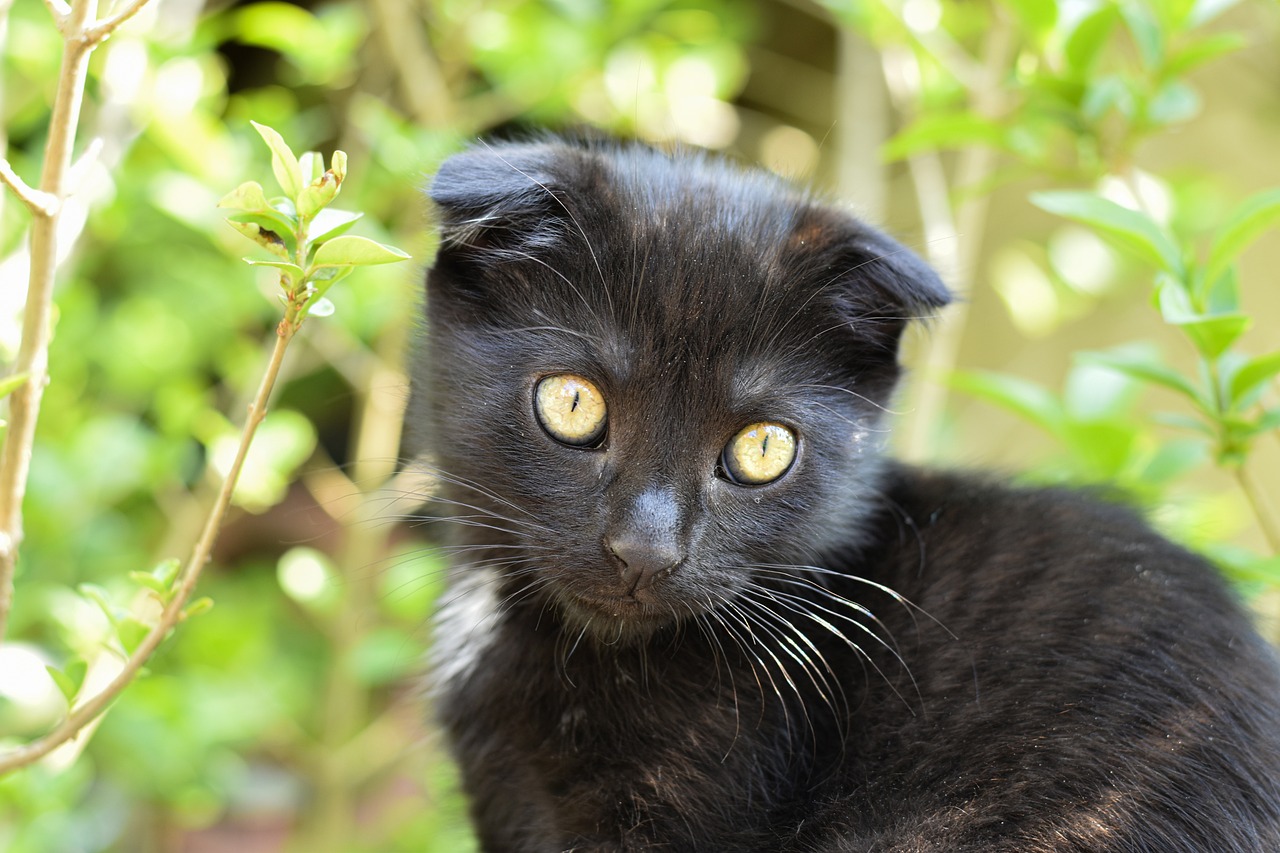
Temperament and Behavior
The Scottish Fold is not just a pretty face; their temperament is one of the most charming aspects of this breed. These cats are renowned for their gentle and affectionate nature, which makes them ideal companions for families and individuals alike. Imagine curling up on the couch after a long day, with your Scottish Fold purring contentedly beside you. Doesn’t that sound delightful?
One of the standout traits of Scottish Folds is their calm demeanor. They are generally not prone to the wild antics that some other breeds exhibit. Instead, they possess a laid-back attitude, making them perfect for both busy households and quiet homes. Their friendly disposition means they often get along well with children, making them a popular choice for families. But how do they interact with other pets?
Scottish Folds are typically very social cats. They enjoy being around people and often follow their owners from room to room, curious about what’s happening. This breed thrives on human interaction, so if you’re looking for a cat that will keep you company and be part of your daily life, the Scottish Fold might just be your perfect match.
In terms of behavior, these cats are known to be playful yet relaxed. They love a good game of chase with a feather toy or a ball, but they also appreciate quiet time lounging in a sunbeam. Their playful nature is balanced with a calmness that makes them easy to live with. You might find that they have their own unique quirks and habits, which only adds to their charm.
Another fascinating aspect of the Scottish Fold’s behavior is their ability to adapt. Whether you have a bustling household or a serene apartment, they adjust well to their environment. However, it’s essential to provide them with mental stimulation and social interaction to keep them happy. Here are some activities that can help:
- Interactive toys that challenge their intelligence
- Regular playtime to keep them active
- Safe spaces to explore and relax
Moreover, their communication style is quite unique. Scottish Folds are known for their soft, sweet meows and gentle purring. They often use these sounds to express their needs or to simply engage with their human companions. If you’re attentive, you’ll quickly learn to understand their vocalizations, making your bond even stronger.
Lastly, it’s important to note that while Scottish Folds are generally friendly and sociable, they can be sensitive to their environment. Sudden changes, loud noises, or aggressive behavior from other pets can stress them out. Therefore, creating a peaceful and loving atmosphere is crucial for their well-being. Remember, a happy Scottish Fold is a healthy Scottish Fold!
Q: Are Scottish Folds good with children?
A: Yes, Scottish Folds are known for their gentle nature and typically get along very well with children.
Q: Do Scottish Folds require a lot of grooming?
A: Their grooming needs are moderate. Regular brushing helps keep their coat healthy and reduces shedding.
Q: Can Scottish Folds be left alone for long periods?
A: While they can tolerate some alone time, they thrive on companionship and may become lonely if left alone for too long.
Q: Are they prone to any specific health issues?
A: Yes, Scottish Folds can be prone to certain genetic conditions, particularly related to their cartilage, so regular vet check-ups are essential.
In conclusion, the temperament and behavior of the Scottish Fold make them not just pets, but beloved family members. Their affectionate and calm nature, combined with their playful spirit, makes them a joy to have around.

Care Requirements
Caring for a Scottish Fold is a rewarding journey that goes beyond just feeding and grooming. These charming cats require a bit of extra attention to their specific needs to ensure they remain happy and healthy. First and foremost, grooming is essential due to their unique coat. Regular brushing helps to reduce shedding and matting, especially in long-haired varieties. Aim for at least twice a week, but daily brushing is ideal for those fluffy ones!
When it comes to diet, a well-balanced, high-quality cat food is crucial. Scottish Folds are known for their love of food, and it’s easy for them to become overweight if their diet isn’t monitored. Look for foods that are high in protein and low in fillers. Make sure to provide fresh water at all times. You might be surprised how much a cat can drink, especially if they’re on dry food! Consider incorporating wet food into their diet a few times a week for hydration and variety.
Health care is another vital aspect of their care. Regular veterinary check-ups are essential to catch any potential issues early. Scottish Folds can be prone to certain health conditions, particularly related to their unique ear structure. Regular ear cleaning and monitoring for signs of discomfort can help prevent problems. Vaccinations and flea and tick prevention should also be part of their health care routine.
Additionally, creating a stimulating environment is key to keeping your Scottish Fold mentally and physically active. They thrive on interaction and playtime, so invest in a variety of toys and scratching posts. Puzzle feeders can also provide both mental stimulation and a fun challenge during mealtime. Remember, a bored cat can become a destructive one!
Lastly, ensure that your home is safe and secure. Cats are naturally curious, and Scottish Folds are no exception. They love to explore, so make sure to remove any hazardous items or plants that could be harmful to them. A cozy, quiet space where they can retreat and relax is also essential for their well-being.
In summary, caring for a Scottish Fold involves a combination of grooming, proper diet, regular health check-ups, mental stimulation, and a safe living environment. By paying attention to these aspects, you’ll foster a loving and nurturing relationship with your feline friend.
- How often should I groom my Scottish Fold?
It’s best to brush them at least twice a week, but daily grooming is ideal, especially for long-haired varieties. - What type of food is best for a Scottish Fold?
Look for high-quality cat food that is rich in protein and low in fillers. Wet food can also be beneficial for hydration. - Are Scottish Folds prone to health issues?
Yes, they can be prone to certain health conditions, particularly those related to their ear structure. Regular vet check-ups are important. - How can I keep my Scottish Fold entertained?
Provide a variety of toys, scratching posts, and interactive playtime to keep them engaged and happy. - Do Scottish Folds get along with other pets?
Generally, yes! With proper socialization, they can coexist peacefully with other pets.
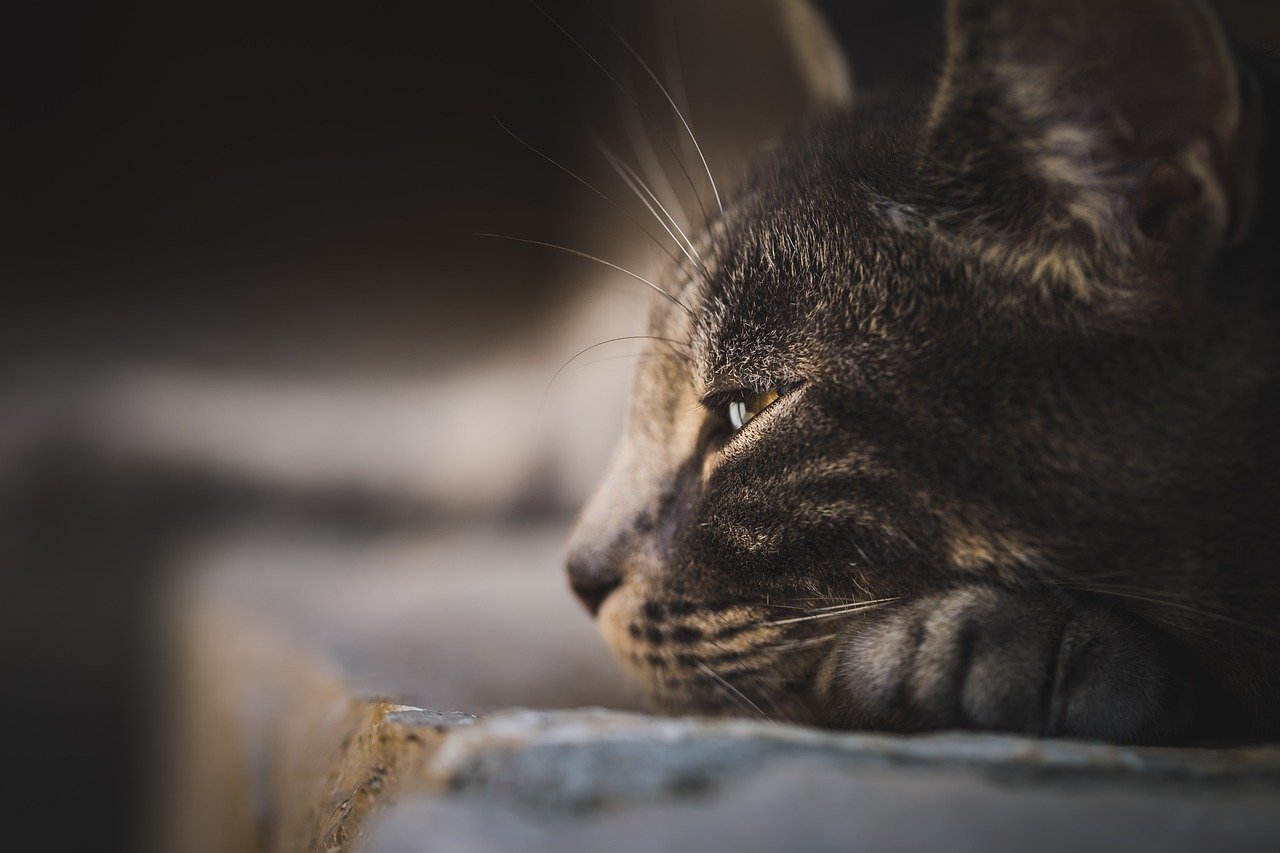
Training Tips
Training a Scottish Fold can be an incredibly rewarding experience, as these felines are not only intelligent but also eager to please their human companions. Their gentle nature makes them receptive to training, but it’s important to approach it with patience and positivity. Just like teaching a child, the key is to keep things fun and engaging. You wouldn’t want to bore them, right? So, let’s dive into some effective strategies that can help you train your Scottish Fold.
First and foremost, positive reinforcement is your best friend. This means rewarding your cat with treats, praise, or playtime whenever they demonstrate desired behavior. For example, if your Scottish Fold uses the litter box correctly, shower them with affection or a tasty treat. This creates a positive association with the behavior you want to encourage. Remember, they respond much better to love than to scolding. Think of it as a game where everyone wins!
Another effective method is to establish a routine. Cats thrive on consistency, and having a set schedule for feeding, playtime, and training can help your Scottish Fold feel more secure and focused. Try to dedicate a few minutes each day to training sessions. Short, frequent sessions are more effective than long, drawn-out ones. Just like a good workout, it’s about quality, not quantity!
When it comes to teaching commands, start with simple ones like “sit” or “come.” Use a clear and friendly tone when giving commands. For instance, when you want your cat to sit, say “sit” while gently guiding their bottom down. Once they comply, don’t forget to reward them immediately! Consistency is crucial here; use the same command every time. This helps reinforce the behavior and makes it easier for your cat to understand what you want.
Additionally, socialization plays a significant role in training. Expose your Scottish Fold to various environments, sounds, and people. This will not only help them become well-adjusted adults but also make training easier. For instance, if they’re used to being around different people, they’re less likely to be skittish during training sessions. Think of it as preparing them for the big stage; the more they practice, the better they perform!
Lastly, don’t forget to be patient. Training is a journey, not a race. Some Scottish Folds may pick up commands quickly, while others might take a bit longer. If your cat isn’t getting a command right away, don’t get frustrated. Instead, take a step back, reassess your approach, and try again later. Remember, every little victory counts!
In summary, training your Scottish Fold can be a delightful experience when you use positive reinforcement, establish a routine, focus on socialization, and maintain patience. With these tips, you’ll not only teach them commands but also strengthen the bond between you and your furry friend.
- How long should training sessions be? Ideally, keep them under 10 minutes to maintain your cat's attention.
- Can I train my Scottish Fold to walk on a leash? Yes, many Scottish Folds can be trained to walk on a leash with patience and positive reinforcement.
- What commands should I start with? Begin with simple commands like "sit," "stay," and "come." These are foundational and easy for them to grasp.
- Is it too late to train an older Scottish Fold? No, it’s never too late! Older cats can learn new tricks, though they may require more patience.

Socialization with Other Pets
When it comes to bringing a Scottish Fold into your home, one of the most rewarding aspects is their ability to socialize with other pets. These cats are generally known for their friendly demeanor and adaptable nature. However, just like with humans, the key to successful socialization lies in the introduction process. Think of it as hosting a party where you want everyone to feel comfortable and included!
To start off on the right paw, it's essential to introduce your Scottish Fold to other pets slowly and cautiously. This process can be broken down into several stages:
- Initial Introduction: Keep the pets in separate rooms at first. Allow them to sniff each other under the door or through a gate. This way, they can get used to each other’s scent without direct contact.
- Supervised Meetings: Once they seem comfortable, allow them to meet in a controlled environment. Keep the meetings short and supervised to avoid overwhelming either pet.
- Positive Reinforcement: Reward good behavior with treats and praise. This will help both pets associate each other with positive experiences.
- Gradual Increase in Interaction: As they grow more accustomed to one another, gradually increase the time they spend together. Always monitor their behavior to ensure everything remains harmonious.
It's also important to recognize that some pets may take longer to adjust than others. For instance, if you have a more dominant dog or a shy cat, patience is key. The Scottish Fold's calm and gentle nature often helps in these situations, as they tend to be less confrontational. They can usually sense when another pet is anxious or uneasy, and their instinct is to remain calm and collected.
Another aspect to consider is the age of the pets involved. Kittens, including Scottish Folds, are often more adaptable and open to forming friendships with other animals. On the other hand, older pets may require more time and a gentle approach. Think of it like teaching an old dog new tricks; it can be done, but it takes a little more effort and understanding.
Lastly, it’s crucial to ensure that each pet has its own space. Providing separate sleeping areas, food bowls, and litter boxes can significantly reduce territorial disputes. It’s like giving each pet their own little kingdom where they can feel safe and secure.
In summary, socializing your Scottish Fold with other pets can be a fun and fulfilling experience that strengthens your household bond. With patience, positive reinforcement, and careful introductions, you'll find that your Scottish Fold can become a beloved member of a multi-pet household.
Q: How long does it take for a Scottish Fold to adjust to new pets?
A: The adjustment period can vary significantly depending on the individual personalities of the pets involved. Generally, it may take anywhere from a few days to several weeks for them to feel comfortable with each other.
Q: What if my Scottish Fold doesn’t get along with my other pets?
A: If your Scottish Fold shows signs of aggression or fear, it may be best to consult a veterinarian or animal behaviorist for tailored advice. Sometimes, additional training or gradual re-introduction may be necessary.
Q: Can I introduce a Scottish Fold to a dog?
A: Yes, many Scottish Folds can get along well with dogs, especially if they are introduced properly. However, it's essential to monitor their interactions closely, especially during the initial meetings.

Health Concerns
The Scottish Fold, while known for its charming personality and unique appearance, is also associated with certain health concerns that potential owners should be aware of. Understanding these issues is crucial for providing the best care for your feline friend. One of the primary health concerns related to this breed is a genetic condition known as osteochondrodysplasia, which affects cartilage development. This condition can lead to joint problems and pain, particularly in the legs and spine. Unfortunately, this can result in a reduced quality of life for your beloved pet.
Moreover, Scottish Folds are also prone to heart disease, specifically hypertrophic cardiomyopathy (HCM). This condition causes the heart muscle to thicken, which can lead to serious complications if not detected early. Regular veterinary check-ups are essential for monitoring your cat's heart health. It’s a good idea to ask your vet about heart screenings, especially if your cat shows any signs of lethargy or difficulty breathing.
Another aspect to consider is their ear health. The unique folded ears of the Scottish Fold can sometimes trap dirt and moisture, making them susceptible to infections. It's important to regularly check and clean their ears to prevent any issues. A gentle wipe with a damp cloth should suffice, but always consult your vet if you notice any unusual discharge or odor.
To help you better understand the potential health concerns associated with Scottish Folds, here's a summary table:
| Health Concern | Description | Preventative Measures |
|---|---|---|
| Osteochondrodysplasia | A genetic condition affecting cartilage development, leading to joint pain. | Regular vet check-ups and monitoring for signs of discomfort. |
| Hypertrophic Cardiomyopathy (HCM) | Heart disease causing thickening of the heart muscle. | Heart screenings and regular veterinary visits. |
| Ear Infections | Infections due to trapped dirt and moisture in folded ears. | Regular cleaning and vet consultations for any unusual signs. |
In addition to these specific health issues, it’s also important to maintain a balanced diet and ensure your Scottish Fold gets enough exercise. Obesity can exacerbate existing health problems and lead to new ones. A healthy diet, combined with interactive play, can help keep your cat fit and happy.
In conclusion, while the Scottish Fold is a delightful breed, being aware of their potential health concerns will allow you to provide the best care possible. Regular veterinary visits, a nutritious diet, and a watchful eye on their behavior will go a long way in ensuring your furry companion remains healthy and vibrant throughout their life.
- What is the lifespan of a Scottish Fold? Scottish Folds typically live between 12 to 15 years, but with proper care, some can live even longer.
- Are Scottish Folds prone to any specific diseases? Yes, they are particularly prone to osteochondrodysplasia and hypertrophic cardiomyopathy.
- How often should I take my Scottish Fold to the vet? Regular check-ups at least once a year are recommended, but more frequent visits may be necessary if health issues arise.
- Can Scottish Folds live with other pets? Yes, they generally get along well with other pets, especially if socialized properly from a young age.

Living Environment
Creating a suitable living environment for your Scottish Fold is essential for their well-being and happiness. These adorable cats thrive in spaces that are not only safe but also stimulating and comfortable. Think of their living space as their personal kingdom, where they can explore, play, and relax. The right environment can significantly impact their mood and behavior, making it crucial for any owner to consider the following aspects.
First and foremost, space is an important factor. Scottish Folds are moderately active and enjoy having room to roam. While they can adapt to apartment living, ensure that they have enough space to stretch their legs and play. A small, cramped area may lead to boredom and restlessness. Consider incorporating a variety of climbing structures or cat trees that allow them to explore vertical spaces, which can be just as important as horizontal ones.
Next, let's talk about comfort. These cats love to curl up in cozy spots, so providing them with soft beds or blankets is a must. Placing their bed in a quiet corner can give them a sense of security and a place to retreat when they need some alone time. Additionally, Scottish Folds appreciate warm areas, so consider positioning their sleeping area away from drafts or cold surfaces.
Moreover, enrichment is key to keeping your Scottish Fold mentally stimulated. Incorporate a variety of toys that encourage play, such as feather wands, interactive puzzles, and balls. Regular playtime not only helps them burn off energy but also strengthens the bond between you and your furry friend. Rotating toys can keep their interest piqued, preventing them from becoming bored with the same items.
Don't forget about the importance of litter box placement. A clean, accessible litter box is vital for any cat, but especially for Scottish Folds, who can be particular about their hygiene. Make sure to place the litter box in a quiet, private location where they feel safe. Regular cleaning will ensure they continue to use it without issue.
Lastly, consider the social environment. Scottish Folds are known for their friendly and affectionate nature, so they thrive in homes where they receive plenty of love and attention. If you have other pets, ensure that they are introduced properly and that your Scottish Fold has a safe space to retreat if they feel overwhelmed. Creating a harmonious environment among pets can lead to a happy household.
In summary, a well-thought-out living environment for your Scottish Fold involves providing ample space, comfort, mental stimulation, proper hygiene, and a loving atmosphere. By focusing on these elements, you can create a sanctuary that allows your Scottish Fold to flourish and be the delightful companion they are meant to be.
- What type of litter is best for Scottish Folds? It's best to use unscented, clumping litter to keep the area clean and odor-free.
- Do Scottish Folds need a lot of exercise? While they are not overly active, they do enjoy playtime and should have opportunities to exercise daily.
- Can Scottish Folds be left alone for long periods? They can tolerate some alone time, but they thrive on companionship, so it's best to spend quality time with them.

Conclusion and Summary
In conclusion, the Scottish Fold cat is not just a breed defined by its unique and adorable appearance but also by its gentle nature and affectionate temperament. Throughout this article, we've explored various aspects of this charming feline, from its intriguing origin in Scotland to its distinctive physical traits that make it so appealing. The Scottish Fold's calm demeanor and friendly disposition make it a perfect companion for families, singles, and even those with other pets.
As potential owners consider welcoming a Scottish Fold into their homes, it's essential to remember the care requirements that come with this breed. Regular grooming, a balanced diet, and attention to health concerns are vital for keeping them happy and healthy. Moreover, understanding their behavior and socialization needs will ensure a harmonious relationship with both humans and other pets.
To summarize, adopting a Scottish Fold means embracing a life filled with affection, playfulness, and a touch of whimsy. Their unique personalities and gentle nature make them a joy to be around. If you're considering adding a Scottish Fold to your family, you're not just getting a pet; you're gaining a loyal companion who will fill your days with love and laughter.
- What makes Scottish Folds different from other breeds? Their unique folded ears and round faces set them apart, along with their gentle and affectionate nature.
- Are Scottish Folds good with children? Yes, they are known to be friendly and calm, making them great companions for children.
- How much grooming do Scottish Folds require? Regular grooming is essential, especially during shedding seasons, to keep their coats healthy.
- Do Scottish Folds have any specific health concerns? Yes, they can be prone to certain genetic conditions, so regular vet check-ups are important.
- Can Scottish Folds adapt to apartment living? Absolutely! They adapt well to various living environments as long as they have enough stimulation and love.
Frequently Asked Questions
- What makes the Scottish Fold unique?
The Scottish Fold is unique primarily due to its distinctive folded ears, which are a result of a genetic mutation. This breed also boasts a round face and large, expressive eyes that add to its charm. Their gentle demeanor and affectionate nature make them stand out as beloved companions.
- Are Scottish Folds good with children and other pets?
Absolutely! Scottish Folds are known for their calm and friendly temperament, which makes them great companions for children and other pets. They generally adapt well to different environments and can form strong bonds with family members, including furry ones.
- What are the grooming needs of a Scottish Fold?
Grooming a Scottish Fold is relatively straightforward. Regular brushing is recommended to keep their coat healthy and free from mats. Additionally, it's important to check their ears regularly, as the unique fold can trap dirt and debris. Keeping their nails trimmed and teeth clean is also essential for their overall health.
- How do I train my Scottish Fold?
Training a Scottish Fold can be a fun and rewarding experience! They are intelligent and eager to please, so using positive reinforcement techniques like treats and praise works wonders. Start with basic commands and gradually introduce new tricks. Remember, patience is key!
- What health issues are common in Scottish Folds?
Like any breed, Scottish Folds can be prone to certain health issues, particularly related to their unique ear structure. They may experience cartilage problems or joint issues. Regular veterinary check-ups and a healthy diet can help mitigate these risks and keep your feline friend in top shape.
- What kind of living environment do Scottish Folds prefer?
Scottish Folds thrive in a safe and stimulating environment. They appreciate cozy spots to curl up in and enjoy interactive toys that keep their minds engaged. Make sure to provide scratching posts and climbing structures, as they love to explore and play!
- How can I ensure my Scottish Fold stays happy?
To keep your Scottish Fold happy, provide plenty of love, attention, and playtime. Regular social interaction is crucial, as they are social creatures. A balanced diet, regular vet visits, and a stimulating environment will also contribute to their overall happiness and well-being.

